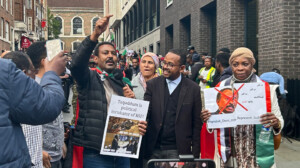Sudan talks: El Mahdi proposes civilian majority govt with military president
El Sadig El Mahdi, chairman of the National Umma Party (NUP), has advised the Alliance for Freedom and Change (AFC) to agree on the formation of a Sovereign Council with a civilian majority and a military presidency. According to Omar El Degeir, leader of the Sudanese Congress Party, the re-activation of the former regime’s trade unions last week is an indication of the military junta’s alignment with counter-revolution forces.
 El Sadig El Mahdi, chairman of the National Umma Party (file photo)
El Sadig El Mahdi, chairman of the National Umma Party (file photo)
El Sadig El Mahdi, chairman of the National Umma Party (NUP), has advised the Alliance for Freedom and Change (AFC) to agree on the formation of a Sovereign Council with a civilian majority and a military presidency. According to Omar El Degeir, leader of the Sudanese Congress Party, the re-activation of the former regime’s trade unions last week is an indication of the military junta’s alignment with counter-revolution forces.
On Thursday evening, El Mahdi held a speech at a press salon in Omdurman in which he stressed the need to form a civilian government of non-politically aligned technocrats, and a parliament representing Sudan’s political forces in a balanced way, and an independent judiciary.
He further suggested the formation of a mechanism for defence and security with a military majority.
The NUP leader warned of an escalation of hostilities between the Transitional Military Council (TMC) that ousted President Omar Al Bashir on April 11, and the AFC.
El Mahdi pointed as well to other challenges, represented by groups adherent to the former regime, and by “the agendas of external axes”. The growing polarisation after the arrest of Al Bashir and his aides may prevent a peaceful transformation of power from the military to the people, he said.
He called for the enactment of a law that must prevent Al Bashir’s National Congress Party (NCP) and the aligned political parties from participating in the first general elections in the country – as “they achieved power for themselves by illegal means”.
He also called for a new law that stipulates local and state governance levels and removes NCP members. He further suggested a mechanism to purge state institutions of corrupt staff members.
Unity
The Sudanese Congress Party and the Communist Party of Sudan, two other opposition parties that signed the Declaration of Freedom and Change on January 1 [text attached below], insist on “a civilian majority, military representation, and fulfilment of the demands of the uprising through negotiations”.
In a joint statement after their meeting on Thursday evening, the two parties emphasised the urgent need for unified political statements in order to strengthen the unity of the Alliance for Freedom and Change (AFC). They said they would “address all the negative aspects that prevailed in the media during the past period”.
Both opposition parties said that they would continue to announce marches as a prelude to civil disobedience actions and a comprehensive general strike next week, in addition to reporting gains achieved during their negotiations with the military junta.

Omar El Degeir, Chairman of the Sudanese Congress Party said he considered the decision of the Transitional Military Council to cancel the suspension of the trade unions, set-up under the reign of Al Bashir as “an indication of the [military junta’s] alignment with counter-revolution forces and an attempt to call their cadres to the political scene”.
He condemned the brief detention of a number of journalists during their protest march on Wednesday, calling this “another indicator of attempts to negate basic freedoms, including the freedoms of expression and organisation”.
The popular opposition leader confirmed that there has been no breakthrough in the TMC-AFC negotiations last week. He pointed to the junta's adherence to a military majority in the Sovereign Council alongside a military presidency, while the AFC stands for a civilian majority and a rotating military-civilian presidency.
Sudan Call
The Sudan Call (an alliance of armed movements, opposition parties and civil society organisations formed in December 2014) has urged the AFC and TMC “to use wisdom to overcome pitfalls during the negotiations, as the country is facing serious challenges in terms of current and future political choices”.
The alliance said in a statement issued in the Australian capital of Vienna on Friday that “the dispute concerning the formation of the Sovereign Council and the presidency can be overcome through dialogue, negotiation and giving priority to the major national interests”.
Our editorial independence means that we can continue to provide factual updates about ongoing protests to Sudanese and international actors, educate people about how to avoid outbreaks of infectious diseases, and provide a window to the world for those in all corners of Sudan. Support Radio Dabanga for as little as €2.50, the equivalent of a cup of coffee.












 and then
and then